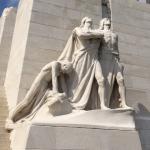I have been posting about apostasy, the act of deserting a faith, whether voluntarily or under coercion. But apostasy could be public, while people held on to other views in secret. This is an ancient issue in the Christian story, and so are the attendant issues of discipline and theology.
The New Testament includes several passages demanding the open proclamation of faith, at whatever cost. As Jesus warned, anyone who failed to acknowledge him in this world could expect no recognition on the Day of Judgment (Matt. 10.33). The Letter to the Hebrews was equally unbending about forgiving apostasy or “falling away” (Heb. 6.6-8). But not all Christian believers could or would live up to such absolute demands, and many resorted to subterfuge and clandestine faith. They became secret or crypto-Christians.
Crypto-Christians survived for centuries under Muslim rule. After the great conversions of the fourteenth century, mainstream Egyptian Muslims never knew quite what to make of the new Coptic converts, whom they called not Muslims but masalima—“pseudo-Muslims” or even “Muslim-ish”—and they treated them with suspicion. As a cynical preacher complained:
Now look at those who embraced Islam, inquire.
Do you find them—any one of them—in any mosque?
If they say they became Muslims—where is the fruit of their Islam?
They were never seen to pray, never fasted or went on pilgrimage:
Or else—you say—they are not Muslims. Then why is poll tax not exacted from them, humiliation not imposed upon them?
Across the Middle East, crypto-Christian families and communities were regularly rediscovered in Turkey and elsewhere, long after their supposed acceptance of Islam. The best-recorded examples are found in the Balkans—in Bulgaria, Serbia, and Albania—where hidden Christians maintained links through activity in seemingly Muslim religious activities, especially through certain Sufi orders. Observers commented on the practice of double faith (South Slavic dvoverstvo, Greek dipistia). One Macedonian congregation, complete with its bishop, formally accepted Islam while pursuing the Christian faith secretly, worshipping by night.
After the Turks conquered Cyprus in 1571, official policies created a substantial Muslim population on the island, but perhaps a third of the converts were Linovamvakoi. They were like a cloth on which cotton (vamvaki) was covered by linen (lino), so that they showed only one side at a time. Often, such multiple loyalty made good practical sense for communities that remembered just how often borders changed and territories changed hands. In the case of the Balkans, these hopes would be justified in the long term, although the time span would be several centuries. Cyprus’s Linovamvakoi had to maintain their disguise from the 1570s to the 1870s.
The churches responded ambiguously to such clandestine practice. As ever more Christians fell under Muslim authority, the desperate situation demanded some kind of accommodation. As early as the 1330s, the patriarch of Constantinople unofficially sanctioned “double faith,” promising that the church would work for the salvation of Anatolian believers who dared not assert their faith openly for fear of punishment, provided that they tried to observe Christian laws. After the fall of Crete in the seventeenth century, the patriarch of Jerusalem similarly permitted surface conversion to Islam on grounds of “inescapable need.”
Generally, Catholic authorities adopted a much harder line than the Orthodox, presumably because their hierarchy did not live under Muslim rule, while many of their Orthodox counterparts did. Nevertheless, throughout Ottoman times, Catholic clergy ministered to secret Christian communities in the Balkans.
Issues of apostasy and “crypto” belief naturally affected other religions, and both Secret Jews and Secret Muslims are subjects of a large literature. I’ll just briefly mention one issue here, in highly over-simplified terms. On Yom Kippur, Jews recite the powerful Kol Nidre, “All Vows,” in which among other things (and with set limitations) they reject vows and oaths they have taken over the previous year, and seek absolution for them. There is a huge and controversial literature on this, but one common interpretation concerns apostasy and forced conversion. In many eras through history, Jews saved their lives by accepting coerced conversion, and swearing to accept a new faith, commonly Christianity. In this Kol Nidre prayer, they are voiding those forced oaths and vows as false and invalid, and reasserting their authentic faith – albeit practiced in “crypto” form.
So again, apostasy, or religious defection, is a much more complex phenomenon than we might think. It is not night and day, black and white. There is a spectrum.












